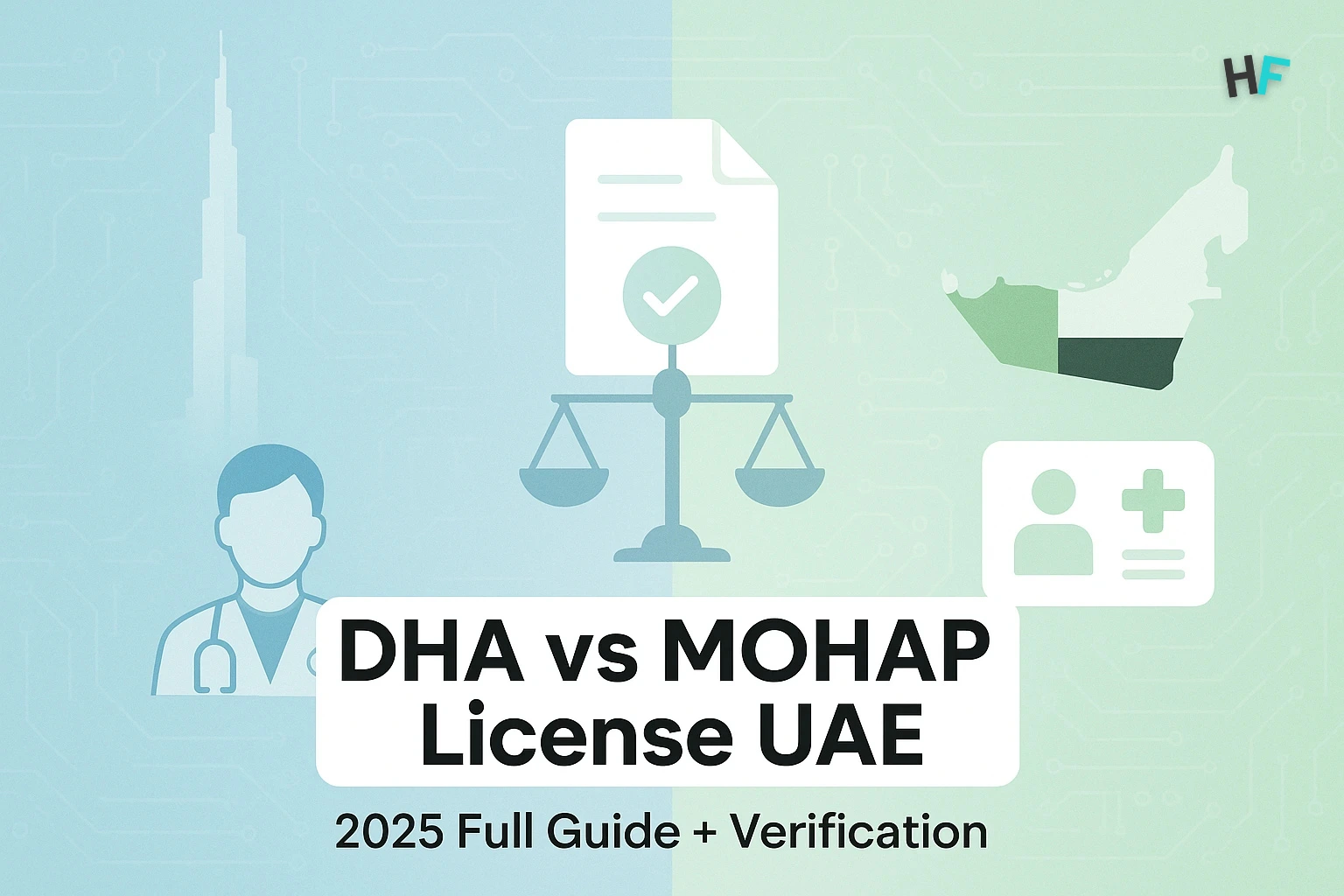In the United Arab Emirates (UAE), all healthcare professionals must obtain a valid medical license from a recognized regulatory body before practicing medicine. The two principal licensing authorities—Dubai Health Authority (DHA) and the Ministry of Health and Prevention (MOHAP)—govern distinct jurisdictions and operate under separate compliance systems. This 2025 guide presents a detailed comparison of DHA vs MOHAP doctor licenses, focusing on jurisdictional authority, eligibility pathways, regulatory frameworks, and verification protocols.
A DHA license is mandatory for practicing medicine in Dubai and is processed through the Sheryan Licensing System, which centralizes credential submission, primary source verification, and permit issuance. Conversely, a MOHAP license enables medical practice in Sharjah, Ajman, Umm Al Quwain, and Fujairah, managed via the MOHAP Professional Licensing Portal. Understanding the inter-emirate licensing boundaries is critical for physicians pursuing multi-jurisdictional credentials or license portability.
Verification of licensure through Sheryan (DHA) and the MOHAP Smart App is a legal requirement for employment validation, malpractice insurance coverage, and public safety. Practicing without appropriate licensure constitutes a breach of Federal Law No. 5 of 2019 on Medical Liability, leading to penalties, invalidated medical records, and denied insurance claims.
This updated 2025 compliance guide outlines the structural differences between DHA and MOHAP doctor licenses, details digital verification workflows, addresses cross-emirate credentialing strategies, and highlights new regulatory updates for medical practitioners, HR compliance teams, and patients seeking licensed providers.
DHA Licensing in Dubai – Scope, Verification & Requirements
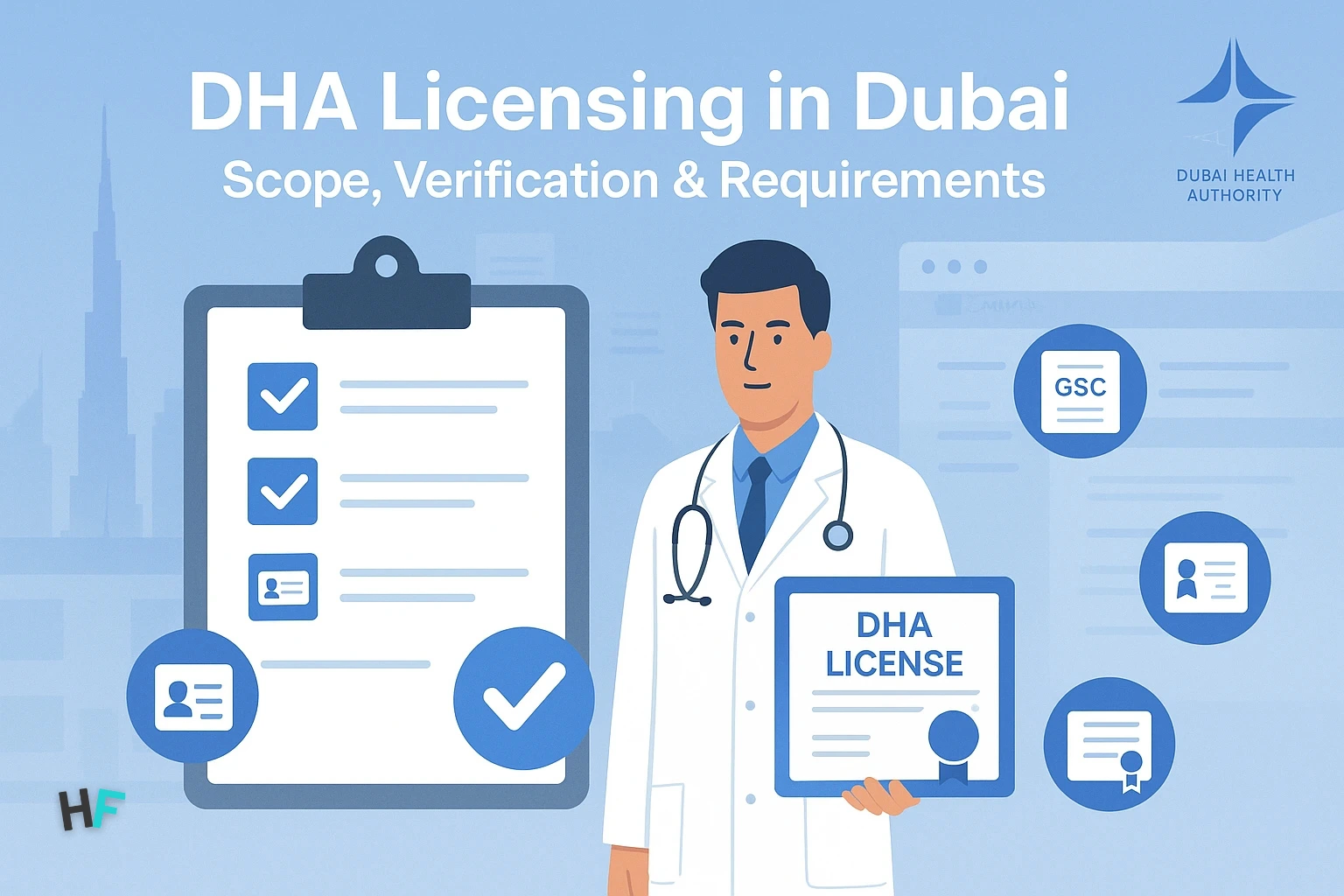
To legally practice medicine or any allied healthcare profession in Dubai, practitioners must obtain a valid DHA License issued by the Dubai Health Authority (DHA). This regulatory credential is mandatory for physicians, dentists, nurses, and allied health professionals, and is processed exclusively through Sheryan, DHA’s centralized digital licensing and compliance portal.
The licensing process begins with fulfilling Professional Qualification Requirements (PQR)—a framework defining the minimum academic degrees, clinical training, and work experience required for each healthcare category. All credentials must undergo Primary Source Verification (PSV) via the DataFlow Group, which authenticates key documents including:
- Certificate of Experience
- Good Standing Certificate (GSC) from relevant medical councils
- Functional Fitness Certificate
- Emirates ID and passport copy
Applicants must complete the DHA Self-Assessment Tool, which automatically evaluates eligibility against PQR criteria. Qualified candidates receive an Eligibility Letter granting access to the DHA Licensing Exam, a Prometric-based test for roles that require clinical competency validation.
Upon successful exam completion and final review, the practitioner is issued an official DHA License, authorizing medical practice exclusively within Dubai. Patients can find DHA-licensed specialists in Dubai through publicly verified directories integrated with the Sheryan Portal. All licensed individuals are registered in the DHA Unified Medical Registry, a public database for real-time license verification.
Employers, insurers, and patients can confirm licensure status, specialization, and compliance history using the Sheryan License Verification Portal, which reinforces transparency and regulatory assurance.
To maintain a DHA license, practitioners must complete periodic renewal, which requires submission of:
- A current Good Standing Certificate
- Valid Emirates ID
- Evidence of Continuing Medical Education (CME) credit hours
- Active malpractice insurance
These requirements ensure ongoing alignment with Federal Law No. 5 of 2019 on Medical Liability, a national legal framework that governs medical accountability, patient rights, and institutional compliance.
How does this compare to MOHAP?
Unlike DHA, which regulates healthcare practice within Dubai only, MOHAP oversees licensing for Sharjah, Ajman, Umm Al Quwain, and Fujairah. It operates through distinct portals, credentialing systems, and examination protocols—differences explored in the next section.
| Criteria | DHA | MOHAP |
|---|---|---|
| Governing Emirate | Dubai | Northern Emirates (except Abu Dhabi) |
| Licensing Portal | Sheryan | MOHAP Portal |
| Eligibility Exams | Prometric UAE / Dubai | Prometric UAE |
| Estimated Processing Time | 4–6 weeks | 4–8 weeks |
| Cost Estimate (2025) | AED 2,000–3,500 | AED 1,800–3,000 |
MOHAP Licensing – Coverage Across Northern Emirates
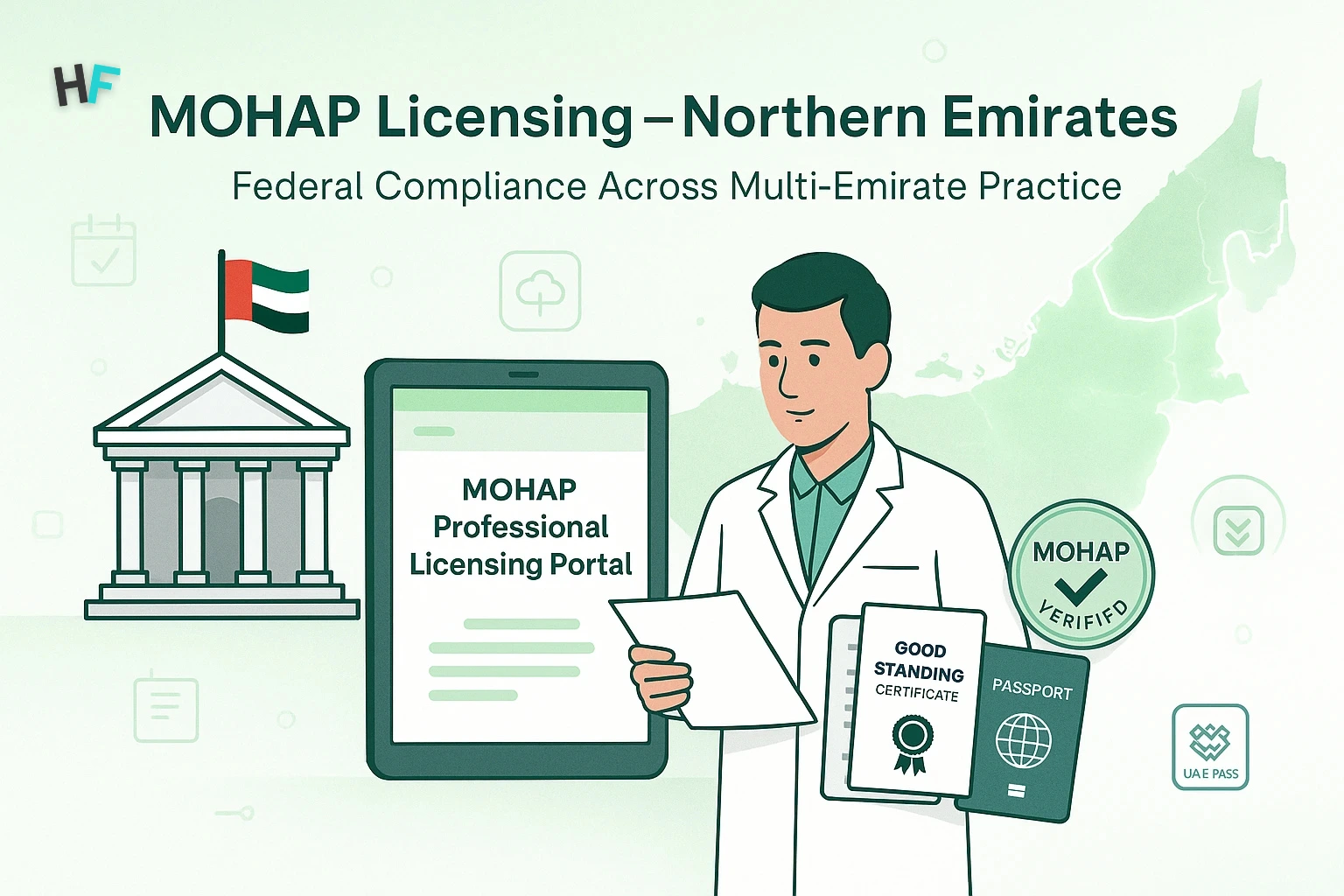
The Ministry of Health and Prevention (MOHAP) serves as the UAE’s federal health regulatory authority, responsible for licensing healthcare professionals across the Northern Emirates, including Sharjah, Ajman, Umm Al Quwain, and Fujairah. Unlike the Dubai Health Authority (DHA), which operates within a single emirate, MOHAP licenses are federally issued and authorize medical practice across multiple jurisdictions, covering both public and private healthcare institutions.
To qualify for a MOHAP License, applicants must meet the Professional Qualification Requirements (PQR)—a standardized framework outlining academic credentials, postgraduate training, and clinical experience for each profession. All credentials must undergo Primary Source Verification (PSV) via the DataFlow Group, ensuring document authenticity for:
- Certificate of Clinical Experience
- Good Standing Certificate (GSC) from relevant licensing bodies
- Medical Fitness Certificate
- Attested academic degrees, Emirates ID, and passport copy
Applications are submitted through the MOHAP Professional Licensing Portal, a centralized digital system offering real-time status updates. Mobile-enabled access is available via the MOHAP Smart App, which streamlines document uploads, appointment scheduling, and application tracking. The platform supports licensing for general practitioners, medical specialists, dentists, pharmacists, lab technologists, and other allied health professionals.
MOHAP also offers a specialized Visiting Doctor Licensing Service for short-term, contract-based medical practice in MOHAP-accredited facilities—ideal for international specialists and healthcare institutions managing surge demands.
Verification of active license status, area of specialization, validity period, and disciplinary history is conducted through the MOHAP e-Services Verification Portal. Access to certain services requires authentication via UAE PASS, the national digital identity system.
All MOHAP licensing procedures align with Federal Law No. 5 of 2019 on Medical Liability, which mandates legal compliance, malpractice accountability, and patient safety across all UAE emirates.
While both DHA and MOHAP apply similar credentialing standards, key differences exist in jurisdictional scope, platform architecture, and licensing workflows. Understanding these regulatory distinctions is essential for healthcare professionals pursuing dual licensure or inter-emirate practice, as well as for recruiters and insurers verifying physician compliance across the UAE.
What’s Changing in 2025? DHA vs MOHAP Policy Updates
Both DHA and MOHAP have rolled out significant updates to their licensing systems in 2025 to improve digital compliance and streamline international recruitment.
| DHA (Dubai Health Authority) | MOHAP (Ministry of Health & Prevention) |
|---|---|
| Launched Sheryan 2.0 with enhanced automation and AI-driven file validation. | Rolled out the MOHAP AI Credential Filter, which flags incomplete applications before submission. |
| Introduced a Fast Track Pathway for specialists with UAE fellowship recognition. | Enabled UAE PASS single sign-on for mobile license renewals. |
| Enforced stricter CME documentation for renewal eligibility. | Implemented federal CME syncing for practitioners holding licenses across MOHAP and DoH. |
These updates reflect the UAE’s push toward integrated digital health governance and improved inter-emirate compliance.
Licensing Authority by Emirate – Quick Lookup Table
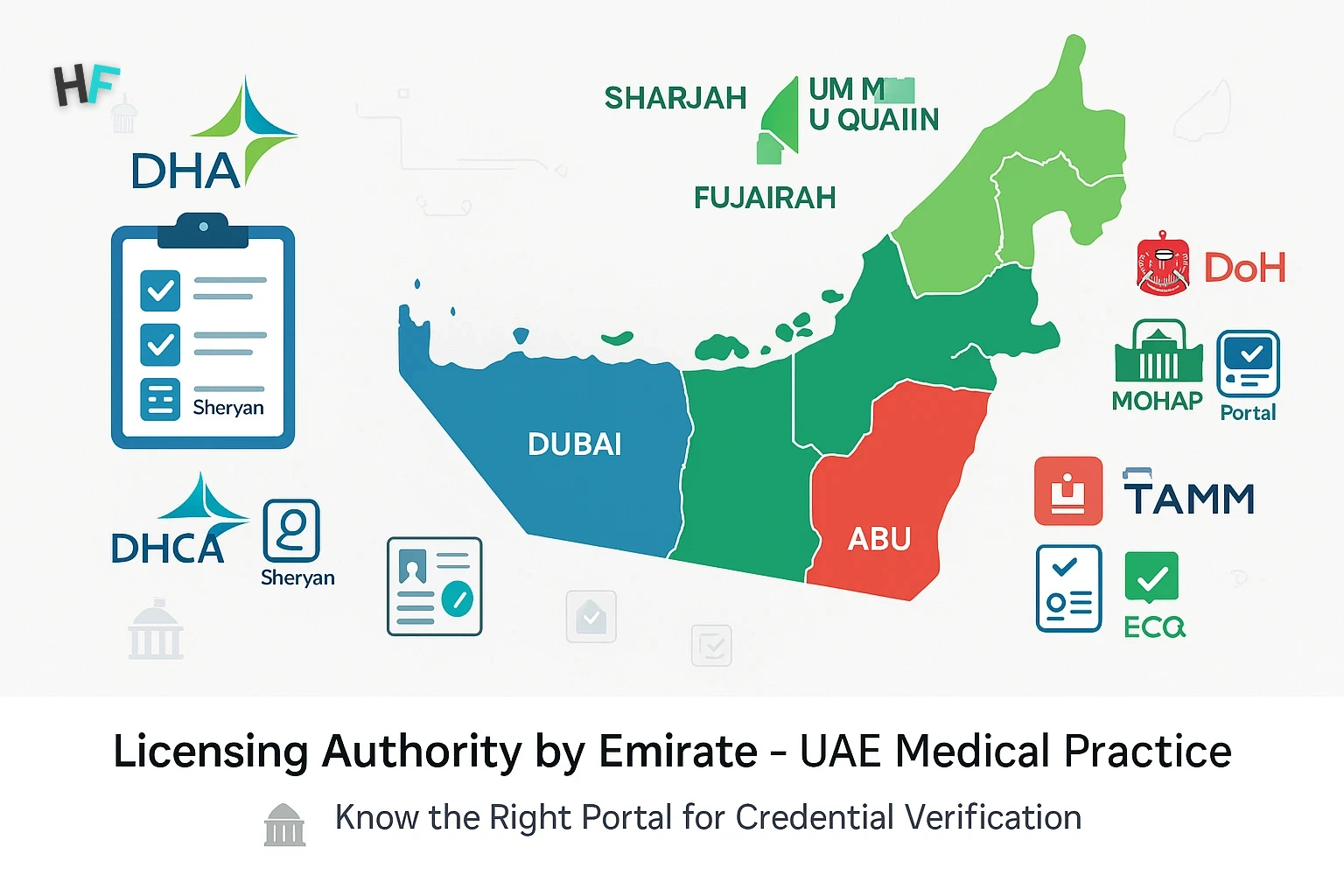
In the United Arab Emirates (UAE), medical licensure is governed through a decentralized regulatory structure, where each emirate or healthcare zone authorizes practice via its designated licensing authority. These jurisdiction-specific bodies enforce compliance with federal and emirate-level standards related to clinical governance, credentialing protocols, and continuing medical education (CME) mandates.
Understanding which authority governs a particular emirate is critical for healthcare recruiters, insurers, facility administrators, patients, and medical tourists. This determines the applicable scope of practice, licensing pathway, and digital verification portal required for lawful operation.
The table below provides a clear mapping of emirate-to-licensing-authority relationships, along with their respective credential verification systems, ensuring streamlined UAE licensing compliance and accurate inter-emirate validation.
Emirate Licensing Reference Table
| Emirate | Licensing Authority | Credential Verification Portal |
|---|---|---|
| Dubai | Dubai Health Authority (DHA) | Sheryan Portal |
| Abu Dhabi | Department of Health – Abu Dhabi (DoH) | TAMM Portal |
| Sharjah | Ministry of Health and Prevention (MOHAP) | MOHAP Professional Licensing Portal |
| Ajman | Ministry of Health and Prevention (MOHAP) | MOHAP Professional Licensing Portal |
| Umm Al Quwain (UAQ) | Ministry of Health and Prevention (MOHAP) | MOHAP Professional Licensing Portal |
| Fujairah | Ministry of Health and Prevention (MOHAP) | MOHAP Professional Licensing Portal |
| Dubai Healthcare City | Dubai Healthcare City Authority (DHCA) | Dubai Healthcare City Regulatory Portal (DHCR) |
Why This Matters for Compliance?
Using the correct emirate-specific verification portal is essential for:
- Validating jurisdictional authority prior to patient consultations
- Confirming dual-licensure or inter-emirate portability for relocated practitioners
- Ensuring insurance claim compatibility with licensing authority
- Supporting medical tourism logistics across emirates
- Conducting institutional credentialing audits and payer verifications
Whether you’re using Sheryan, TAMM, the MOHAP Licensing Portal, or DHCR, each portal reflects real-time licensure status, specialty, expiration, and disciplinary records—key for mitigating legal risk under Federal Law No. 5 of 2019 on Medical Liability and local health regulations.
DHA vs MOHAP vs DoH – Licensing Authority Comparison
| Feature | DHA (Dubai) | MOHAP (Northern Emirates) | DoH (Abu Dhabi) |
|---|---|---|---|
| Jurisdiction | Dubai | Sharjah, Ajman, UAQ, Fujairah | Abu Dhabi |
| Licensing System | Sheryan | MOHAP Portal + Smart App | TAMM + DoH Licensing System |
| Verification App | Sheryan Portal | MOHAP Smart App | TAMM Portal |
| License Transfer Accepted | From MOHAP/DoH with validation | From DHA/DoH with re-evaluation | From DHA/MOHAP with exam confirmation |
| Exam Provider | Prometric | Prometric | Pearson VUE |
| Cost Estimate (2025) | AED 2,000–3,500 | AED 1,800–3,000 | AED 3,000–5,000 |
Understanding these differences is essential for physicians considering dual-licensure or long-term mobility across UAE’s healthcare sectors.
How to Verify a Doctor’s License in UAE (DHA vs MOHAP Platforms Compared)
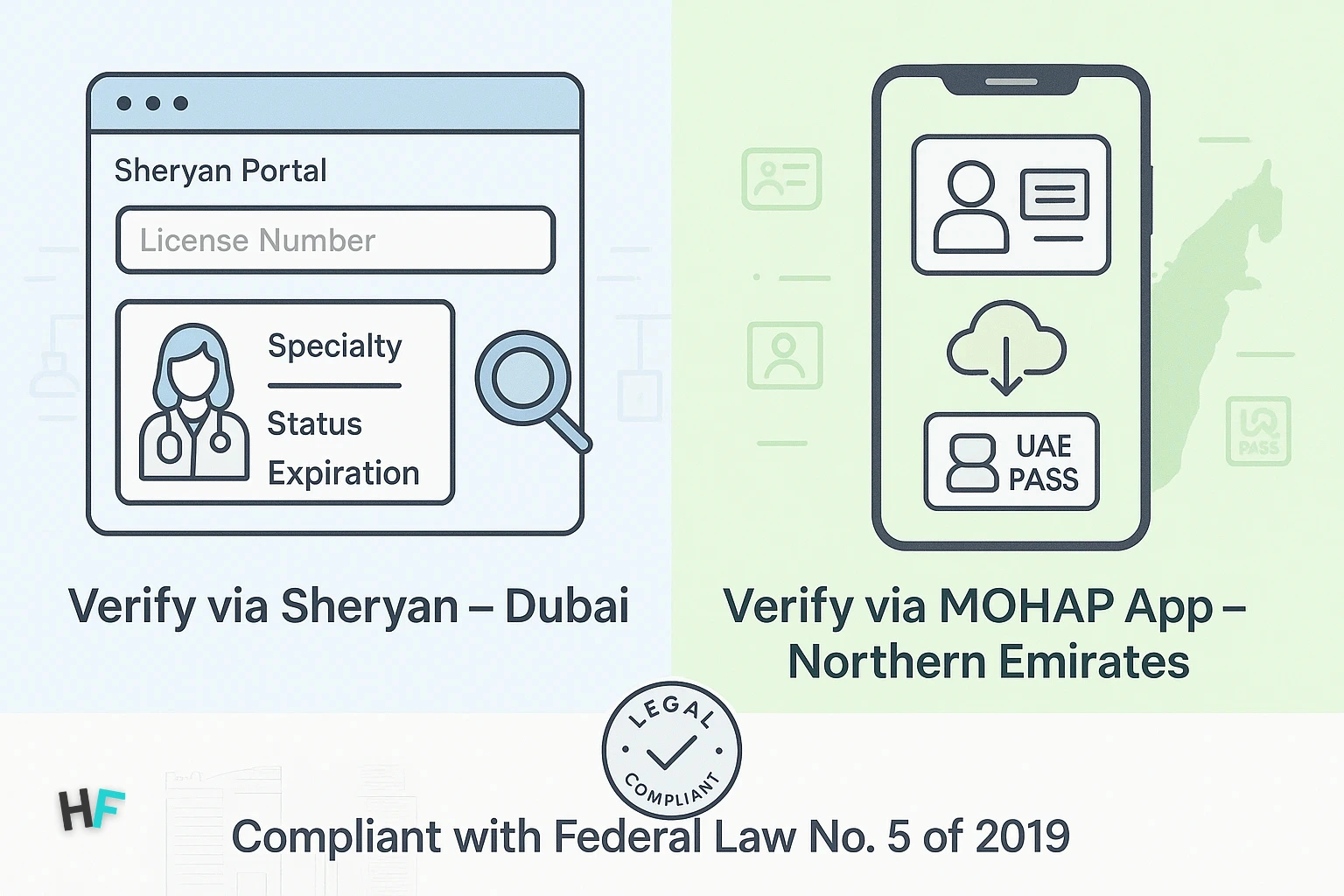
Verifying a healthcare professional’s license in the United Arab Emirates (UAE) is a legally mandated step under Federal Law No. 5 of 2019 on Medical Liability. Whether you’re a patient, hospital administrator, medical recruiter, or insurance provider, confirming a doctor’s licensure helps protect against unqualified care, insurance claim rejection, and regulatory violations.
The UAE has two main health authorities, each overseeing license issuance and digital verification in their respective jurisdictions:
- Dubai Health Authority (DHA) – for practitioners operating in Dubai
- Ministry of Health and Prevention (MOHAP) – for licenses valid in Sharjah, Ajman, Umm Al Quwain (UAQ), and Fujairah
Each authority provides its own digital verification platform, offering access to core license data including status, medical specialty, disciplinary history, and expiration date.
DHA License Verification (Dubai)
Platform: Sheryan Licensing Portal
Registry: Dubai Medical Registry
How to verify a DHA-licensed doctor:
1. Access the Sheryan Portal
2. Navigate to “Search Professional” or “License Verification”
3. Enter one or more of the following fields:
- Doctor’s full name
- DHA license number
- Healthcare facility affiliation
4. Review verified details:
- License status (Active, Expired, Suspended)
- Primary & sub-specialties
- Good Standing Certificate (GSC) status
- Issue & expiration dates
- Employing facility name
5. Download or screenshot results for documentation or insurance claims.
MOHAP License Verification (Sharjah, Ajman, UAQ, Fujairah)
Platforms:
-
MOHAP Smart App (iOS/Android)
How to verify a MOHAP-licensed doctor?
1. Visit the MOHAP e-Services Portal or open the MOHAP Smart App
2. Go to: “Healthcare Professionals” → “Search Licensed Professional”
3. Input the following fields:
- Doctor’s full name
- License number or Emirates ID
- Medical specialty
4. Review returned data:
- License status & expiration
- Jurisdiction of practice
- Specialty & sub-specialties
- Disciplinary history (if disclosed)
- CME compliance (where available)
5. Log in via UAE PASS to access full disciplinary reports or official verification documents.
After verifying a doctor’s license status, specialization, and jurisdiction through DHA or MOHAP portals, patients should also evaluate whether the doctor’s qualifications and scope of practice align with their medical needs. For guidance on this, see our dedicated resource on how to choose the right doctor based on licensing and specialty in the UAE.
Can You Convert a MOHAP License to DHA? Cross-Authority Transfer Explained (2025)
While DHA and MOHAP operate under separate regulatory systems, **license transfer between authorities is possible**, but not automatic.
| Transfer Process Overview | |
|---|---|
| 1. Apply for Primary Source Verification (PSV) via DataFlow under the target authority (e.g., DHA). 2. Submit a Good Standing Certificate (GSC) issued by MOHAP. 3. Re-complete the Professional Qualification Requirements (PQR) evaluation with DHA. 4. Sit for the DHA licensing exam if waived criteria are not met. 5. Await final approval through Sheryan. |
|
| Key Considerations | |
| – DHA may not accept MOHAP-specific exemptions (e.g., local CME credits). – Specialists often face more scrutiny during conversion. – Transferring between licensing bodies typically takes 4–6 weeks. |
Tip: If you plan to practice in both Dubai and Northern Emirates, dual-licensure is often more efficient than transferring.
DHA vs MOHAP License Verification – Feature Comparison
| Feature | DHA (Sheryan) | MOHAP (Portal/Smart App) |
|---|---|---|
| Jurisdiction | Dubai only | Sharjah, Ajman, UAQ, Fujairah |
| Access Method | Web | Web + Mobile App |
| Required Info | Name, license number, facility | Name, license number, specialty |
| Extra Authentication | None | UAE PASS for full data access |
| Good Standing Status (GSC) | Yes | Yes |
| Disciplinary Record Access | Yes | Yes (with login) |
Why License Verification Matters?
Failing to verify a healthcare provider’s license can lead to:
- Insurance claim denials for unregistered practitioners
- Invalid prescriptions or medical reports
- Legal exposure under Federal Law No. 5 of 2019
- Referral errors across emirate jurisdictions
- Audit failures during facility inspections or payer reviews
Always verify before scheduling treatment, signing employment contracts, or processing insurance paperwork. A few minutes of due diligence protects patients, employers, and institutions alike.
How DHA and MOHAP Licensing Affects Patients in the UAE?
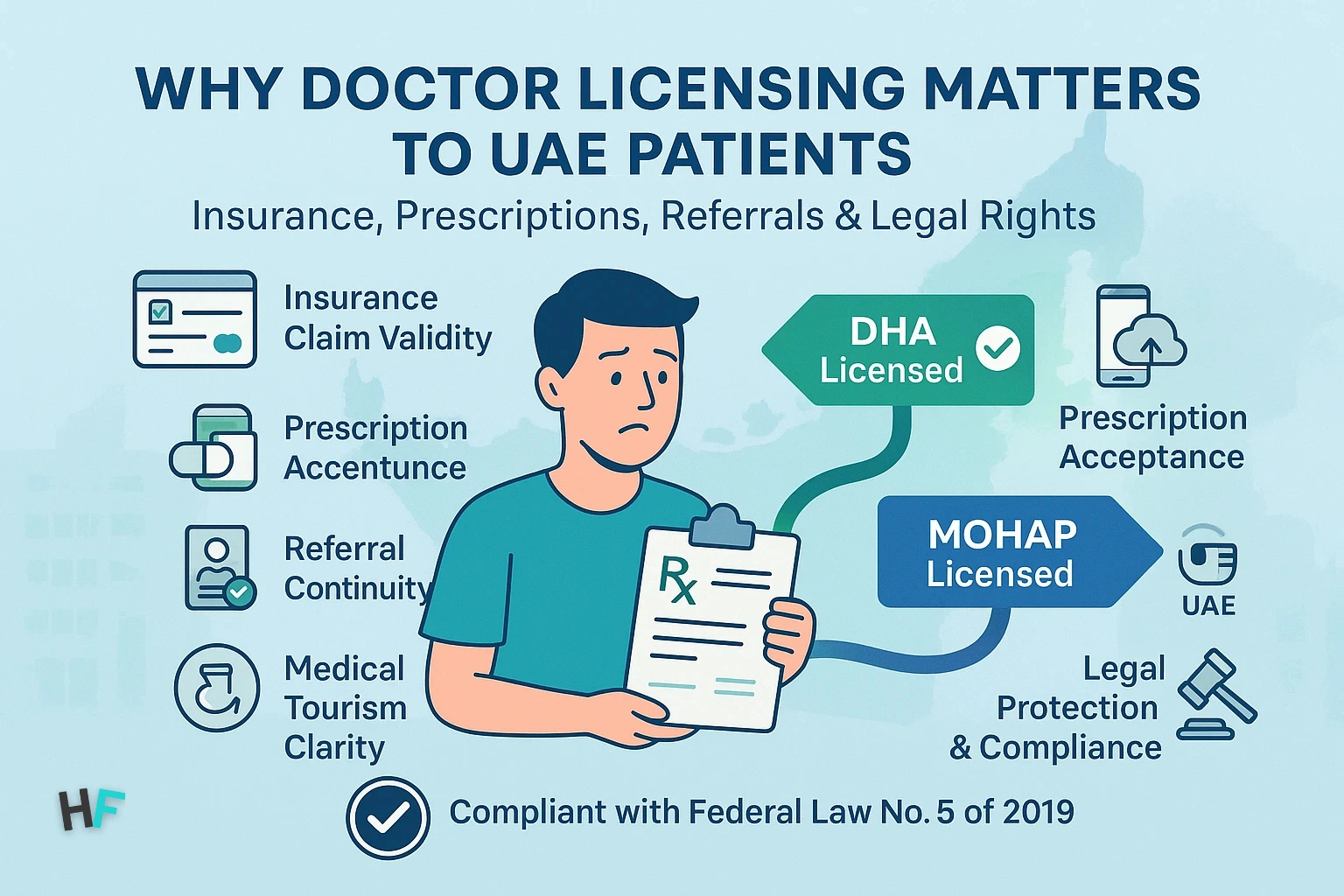
In the UAE, a doctor’s license is not merely a regulatory formality—it directly impacts insurance claim eligibility, prescription validity, referral integrity, and legal protection for patients. Under Federal Law No. 5 of 2019 on Medical Liability, patients must receive care only from actively licensed and jurisdiction-compliant practitioners to ensure both clinical legitimacy and insurance reimbursement.
The UAE’s decentralized healthcare licensing system delegates jurisdiction to specific authorities:
- DHA – Dubai Health Authority (for Dubai)
- MOHAP – Ministry of Health and Prevention (for Sharjah, Ajman, UAQ, Fujairah)
- DoH – Department of Health – Abu Dhabi (for Abu Dhabi)
This regulatory segmentation significantly affects patient experiences across the following domains:
1. Insurance Claim Eligibility
Health insurance providers only approve claims if the treating physician is licensed by the correct emirate-specific authority.
Example: A MOHAP-licensed doctor providing services in Dubai without a DHA license may trigger insurance claim denial, resulting in out-of-pocket expenses.
Patient Tip: Before consultations or surgical procedures, confirm that the doctor is licensed by the authority governing the treatment location.
2. Prescription Validity & Pharmacy Fulfillment
Prescriptions issued outside a doctor’s licensed jurisdiction may be:
- Rejected by UAE pharmacies
- Flagged as legally noncompliant
- Cause delays in medication access or specialist referrals
This is especially critical for controlled substances, diagnostics, and specialist referrals. Patients should ensure their physician is licensed before any health checkup or diagnostic procedure to prevent prescription rejections, diagnostic delays, or insurance complications.
Patient Tip: Ensure the prescribing doctor holds a valid license in the emirate where the prescription is filled.
3. Cross-Emirate Referrals & Continuity of Care
Referrals between general practitioners and specialists across emirates must respect licensing boundaries.
A DHA-licensed GP referring to a MOHAP-licensed specialist (or vice versa) may result in insurance coverage issues, referral rejection, or trust breakdowns unless both are dually licensed. Many top multi-specialty clinics with DHA and MOHAP-licensed doctors are structured to ensure seamless referrals across emirates.
Remote care services face similar challenges. Are telemedicine doctors in the UAE DHA/MOHAP compliant? Understanding virtual doctor licensing is critical when using cross-emirate platforms.
Patient Tip: Ask whether both referring and receiving providers hold licenses under the relevant authorities.
4. Medical Tourism & Expat Considerations
Patients from abroad often assume UAE licensure is federally transferrable. In reality:
- Licenses are emirate-bound
- Cross-jurisdiction practice requires dual or transferred licensure
- Patients risk out-of-network billing, invalid medical paperwork, and treatment delays
Patient Tip: Confirm a provider’s licensing matches the emirate of service, especially when coordinating multi-emirate treatments.
5. Legal Exposure & Malpractice Liability
Receiving care from an unlicensed or expired-license provider may:
- Invalidate medical reports, sick leaves, and insurance documents
- Undermine malpractice claims
- Constitute a breach of Federal Law No. 5 of 2019
Patient Tip: Ask to see proof of a doctor’s Good Standing Certificate (GSC) and confirm it via the official portals.
Patient Safety & Compliance Checklis
- Verify licensure: Use Sheryan Portal (DHA) or the MOHAP Licensing Portal for real-time validation.
- Confirm dual licensing: If referred across emirates, check whether the specialist is licensed under both authorities.
- Keep documentation: Save digital or printed proof of the doctor’s Good Standing Certificate (GSC) for insurance or legal purposes.
- Contact your insurer: Confirm the doctor is within your approved network and jurisdiction before beginning treatment.
Why This Matters:
Maintaining awareness of licensing boundaries, digital verification steps, and insurance-linked compliance helps patients avoid delays, financial loss, and legal complications. The UAE’s healthcare system offers world-class care—but navigating its licensure structure requires informed action.
FAQs – DHA vs MOHAP Licensing
Most UAE medical licenses are valid for 1 to 2 years, based on specialty and authority. Renewal typically requires: Renewal reminders are issued through Sheryan (DHA) or the MOHAP Portal. A Good Standing Certificate confirms that a doctor has no disciplinary actions, malpractice rulings, or license suspensions during the validity period. It is required for: Patients may view or request the GSC status via Sheryan or MOHAP systems. Yes. Public portals allow patients to check a doctor’s: Additional history, such as suspensions or disciplinary actions, may require login via UAE PASS, the national digital identity system.
Dr. Aisha Rahman is a board-certified internal medicine specialist with over 12 years of clinical experience in chronic disease management and preventive healthcare. She has worked at leading hospitals across the UAE, helping patients manage conditions such as diabetes, hypertension, cardiovascular diseases, and metabolic disorders.
A strong advocate for preventive medicine, Dr. Rahman emphasizes early diagnosis, lifestyle modifications, and patient education to reduce chronic illness risks. She is an active member of the Emirates Medical Association and has contributed to health awareness programs and medical research initiatives. Her expertise has been featured in The National UAE, Gulf Health Magazine, and leading medical journals. As a keynote speaker at healthcare conferences, she shares insights on evidence-based treatments, patient-centered care, and advancements in internal medicine.

